Burkina Faso is a small country in West Africa. At 274,200 sq. km, it is about the size of the state of Colorado.
With a population of about 16.3 million people, Burkina has a Sahelian climate with pronounced wet and dry seasons. Burkina Faso is an ethnically integrated, secular state. Officially, there are 63 ethnic groups in the country.
Burkina Faso is also a country of culture, and because of the diversity of ethnic groups, many cultural practices are observed. One of the most important and widespread customs in Burkina Faso is Rakiire (cross-ethnic joking).
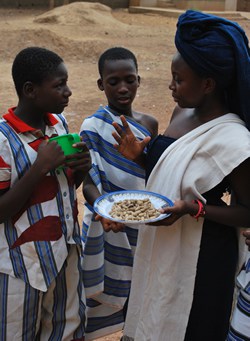
According to Alain Joseph, research director at the Societies Sciences Institute of Ouagadougou, two types of Rakiire should be considered. The first type of Rakiire is the family joking relationship.
This kind of Rakiire exists within the same family between grandson and grandmother, granddaughter and grandfather, husband and junior sister-in-law, and nephews/nieces and aunts.
The second type of Rakiire is the cross-ethnic joking relationship. In this case, two or more ethnic groups decide freely to make an agreement that includes a nonaggression pact and mutual support.
But what is Rakiire?
Rakiire consists of two people within the same big family or two different ethnic groups telling jokes that are often very sour and border on insolence. For instance, a grandson will say to his grandmother,
“Are you still alive, Grandmother? When are you dying?”
The grandmother will answer:
“Naughty boy, I will survive you.”
In the case of Rakiire between two ethnic groups, two people who meet can talk to each other as follows:
First person:
“Hello, how is your good-for-nothing father doing?”
Second person:
“Hi! My father is well. How about your wreck of father?”
These hard words are not meant to harm or despise, but to express membership of community.
Rakiire is a thousand-year-old custom. No one can say when exactly it started; however, cross-ethnic joking is considered a dynamic, evolutionary practice.
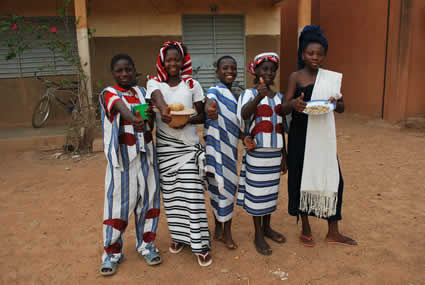
Rakiire within a big family evolves as marital relations are formed and children are brought into the world. Rakiire insults never lead to a brawl.
When a person starts “insulting” the parents of someone else, he can only insult the father. The mother is not insulted because generally she is from another ethnic group. The purpose of these joke “insults” is to allow people to have fun and remember the pact of nonaggression and assistance that exists between their ethnic groups.
In his book Alliances and Cross-ethnic Joking in Burkina Faso, Alain Joseph speaks about the role Rakiire plays with those who practice it. Both children and adults learn how to have a culture of tolerance and accept others just as they are. Thus, various social groups learn how to live together.
Rakiire makes it possible to remember that the person in front of you is not your enemy, but someone with whom you can maintain a nonaggressive relationship, whatever the situation.
In case of conflict, it is possible to actually use Rakiire to defuse the conflict. In fact, Rakiire can be connected with the freedom of speech. One is free to voice what he thinks without being worried. Author Joseph explains,
“One plays the symbolic war so as not to wage real war.”
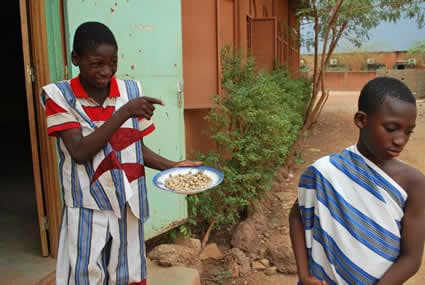
Rakiire is practiced most often in rural environments. In the modern society of Burkina Faso, Rakiire is known only in a very superficial way. It is very often seen like folklore, a means to let off steam and get away with it. Few people in big cities fully practice Rakiire.
The ignorance of Rakiire in the cities means that when an unspecified crisis is declared, it is necessary to resort to other methods to address the crisis. Those who believe in Rakiire can rely on the values of tolerance and the nonaggressiveness of Rakiire to avoid revenge or reprisals and maintain social cohesion.
Some Rakiire relationships were born after bloody conflicts as a way of saying “never again.”
Rakiire is also found among Christians. Just as in society as a whole, it is seen as the cement of fraternity and friendship between people. Obviously, Christians in the church do not allow themselves to be as virulent when exchanging opinions. They are more kind and exchange only decent, but funny jokes.
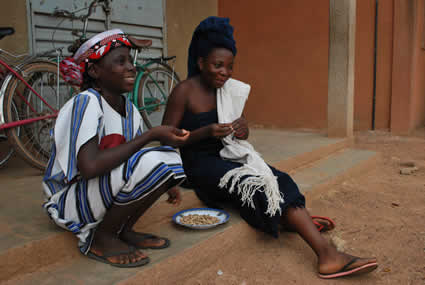
For example, a Gourmantché person (Gourmantché people live in the eastern part of the country) who arrives at a church for the first time and introduces himself will quickly will become friends with a Yadsés person (from the northern part of the country) in the church.
There is even an organization in the country called Association Burkinabe pour la Promotion de la Parenté à Plaisanterie, which means Association for the Promotion of Cross-Ethnic Joking in Burkina. This association has organized three cross-ethnic joking days in Ouagadougou, where many activities related to traditions and ethnic customs are demonstrated.
The organization aims at promoting Rakiire in cities so that it can bring peace between individuals and among ethnic groups.
While Rakiire cannot be used to resolve all crises in society, it has its place in the culture of Burkina Faso.


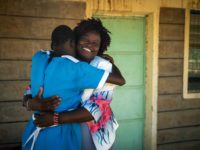




12 Comments |Add a comment
As an American, with so little idea of life here, may I ask?? What does a dollar mean in this country??
Thank you for your question, Jacquelyn! On average, one USD is about 550 West African CFA francs. One pound of rice is about 330 CFA francs.I hope this helps paint a better picture for you. ?
Thank you for this very interesting and informative article. Imagine that – freedom of expression over political correctness!
My man Cedric is from Burkina – I have a feeling he will grow up to be a fantasticly known Rakiire joker!
Thank you SO Much for posting this amazing article! Our “son” we support is from Burkina Faso!!! I’m very excited to learn this and I plan to ask him a little about it in a letter. I would like to know if this is something he and his family do! Thank you thank you!!! This opens up more of a door to getting to know our dear “son”.
It normally exists almost in each family since they belong to an ethnic group. Unfortunately, with the development of city-type of life, this value tends to fade. The ministry of culture tries to promote it by annually organizing an event where people from various ethnic groups meet to practice.
Your “son” & family will certainly be amazed to know you’re aware of it.
Really sad that it is being allowed to die out in the cities, its a beautiful way of easing communal conflict and encouraging a friendly secure, environment, but cities generally lead the way in the way society behaviour develops in the future.
It reminds me a little of blond jokes or even more of “Polak” jokes. Now, I wonder how we should talk about this with our children from Burkina Faso.
is this anything like playing the ‘dozens’ among some of the ethnic groups in the US. like “your mama’s so fat….” ?
Wow! What an out of the box way of addressing ethnic conflict in society! Good on you Burkina Faso, we can learn from you!
Thanks Paul for a very educational post 🙂
My American mind is having a hard time wrapping itself around this concept. Such a foreign idea to me but I’m grateful to get yet another peek into the Burkinabe’ culture. Thank you Paul Henri Kabore!
Among us Irish, it’s called “slagging”, and it is also a way of showing acceptance. If you’re not slagged, you haven’t been fully accepted into the group. It’s almost a code, really. It’s a way of insulting and you’re expected to insult back! And it’s all in fun and does not lead to fighting.